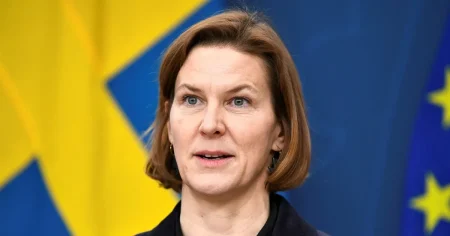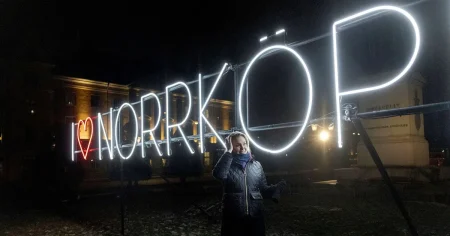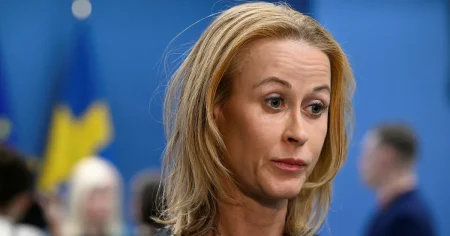The Tidö parties, the governing coalition in Sweden, have proposed new regulations for party-political lotteries, aiming to increase transparency and protect vulnerable individuals while upholding democratic principles. The core of the proposal centers around enhanced transparency regarding the flow of funds generated by these lotteries. This measure is designed to ensure public awareness of the financial benefits accruing to specific political parties through lottery operations. Furthermore, the proposal mandates that bonus restrictions and credit bans be applied to party lotteries, mirroring regulations prevalent in other gambling sectors. Finally, party-political lotteries will be subject to a 22 percent gambling tax, aligning them with commercial lottery operations.
The coalition argues that this reform reinforces both public trust and democratic values. Finance Minister Niklas Wykman emphasized the dual nature of the reform, highlighting its role in bolstering public confidence while safeguarding the integrity of the democratic process. He underscored the potential conflict between a political party’s financial interests and the broader societal goal of maintaining a robust and resilient democracy. By imposing stricter financial regulations, the government aims to mitigate the risk of undue influence and maintain public trust in the impartiality of the political system. The Tidö parties believe that transparency and financial regulations can create a level playing field and prevent the perception of parties prioritizing their own financial gains over the needs of the citizenry.
The proposed regulations differentiate between party-political lotteries and those operated by charitable organizations. While party lotteries will be subject to the new tax, lotteries raising funds for causes such as cancer research will remain exempt. Liberal Party spokesperson Robert Hannah justified this distinction by arguing that exempting party lotteries constitutes an indirect state subsidy, benefiting only those parties that choose to operate them. This disparity, according to Hannah, creates an uneven playing field and potentially undermines the democratic process by favoring parties that engage in lottery activities. The Tidö parties believe this measure will encourage responsible fundraising practices and prevent parties from relying excessively on potentially exploitative lottery operations.
These proposed changes echo recommendations from a government-commissioned report released earlier this year. However, the initial announcement of the investigation sparked controversy, particularly from the Social Democrats, who derive significant revenue from their lottery operations through the company Kombispel. The Social Democrats raised concerns about potential political motivations behind the investigation and the impact of the proposed changes on their fundraising capabilities. The timing of the investigation, shortly after a change in government, further fueled suspicions of political maneuvering. The debate surrounding party-political lotteries underscores the complex interplay between party financing, public perception, and democratic integrity.
The impetus for these reforms was further intensified by a recent exposé by the newspaper Dagens Nyheter (DN), which revealed aggressive telephone sales tactics employed by Social Democrat representatives targeting vulnerable and elderly individuals for their lottery subscriptions. The Tidö parties assert that the new regulations will directly address the issues highlighted by the DN report. Wykman anticipates a “disciplining effect” stemming from the increased transparency requirements, making it more evident to potential participants that the lotteries directly benefit specific political parties. Civil Minister Erik Slottner emphasized the importance of the credit ban, pointing out that vulnerable individuals often resort to credit as their sole means of participating in these lotteries. The combination of increased transparency and credit restrictions aims to curb exploitative practices and protect vulnerable groups from undue pressure to participate in party-political lotteries.
While the Tidö parties have previously considered an outright ban on party-political lotteries, they have opted for a more moderate approach with these regulations. Wykman signaled a willingness to reconsider a full ban if the new rules prove insufficient to address persistent issues. This approach suggests a phased strategy, with the current regulations serving as a first step, followed by potential further restrictions if necessary. This cautious approach allows the government to assess the impact of the new rules before implementing more drastic measures. Meanwhile, the Sweden Democrats, a member of the governing coalition, maintain their support for a complete ban, highlighting the issue as a matter of democratic principle. This internal difference of opinion within the coalition suggests ongoing debate on the appropriate level of regulation for party-political lotteries. Alexander Christiansson, representing the Sweden Democrats, reiterated their commitment to pursuing a full ban, highlighting the perceived threat these lotteries pose to democratic integrity.
Finally, it’s important to contextualize the scale of party-political lotteries in Sweden. Only two of the parliamentary parties, the Social Democrats and the Moderates, currently operate lotteries. In 2022, the Moderates’ lottery generated a smaller revenue compared to the Social Democrats’ operation, which yielded significantly higher profits. However, the Social Democrats’ lottery revenue decreased significantly in 2023 following the controversies and increased scrutiny. While this decrease might be attributed to several factors, it coincides with increased public awareness and discussions surrounding the ethical implications of party-political lotteries. The contrasting financial outcomes of the two parties’ lotteries underscore the varying degrees of reliance on this fundraising method. The debate over party-political lotteries is likely to continue as the new regulations take effect and their impact on party financing and public perception becomes clearer. The Tidö parties’ proposed regulations represent a significant shift in the landscape of party financing in Sweden, aiming to strike a balance between allowing parties to raise funds and protecting the integrity of the democratic process.














